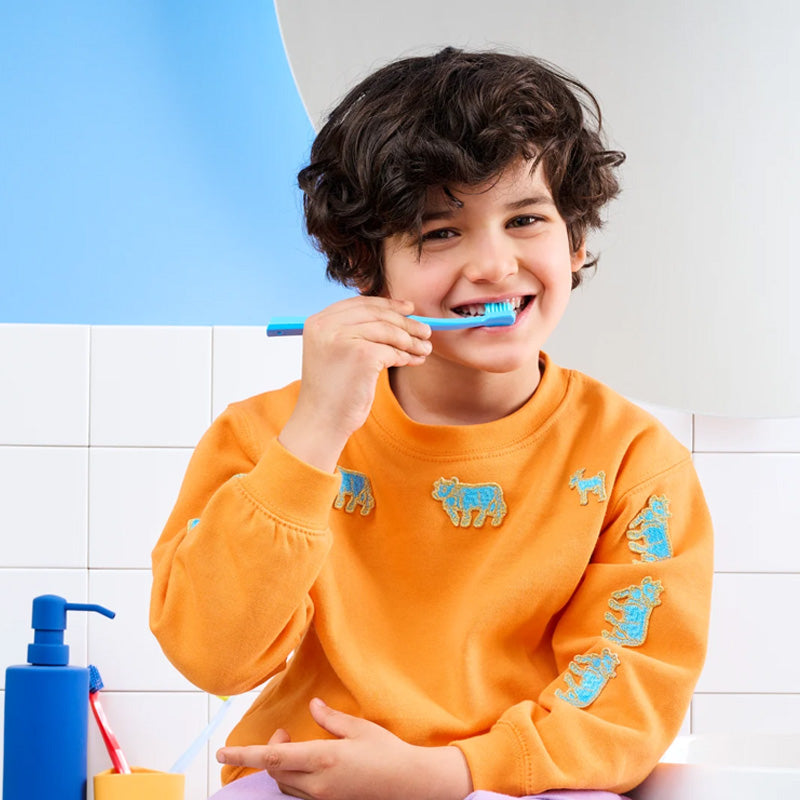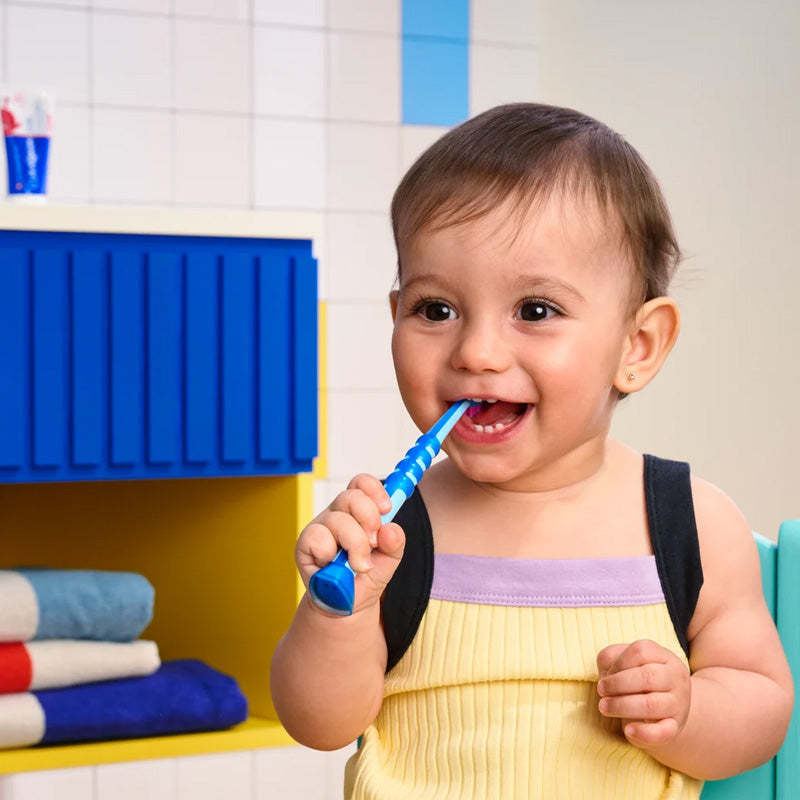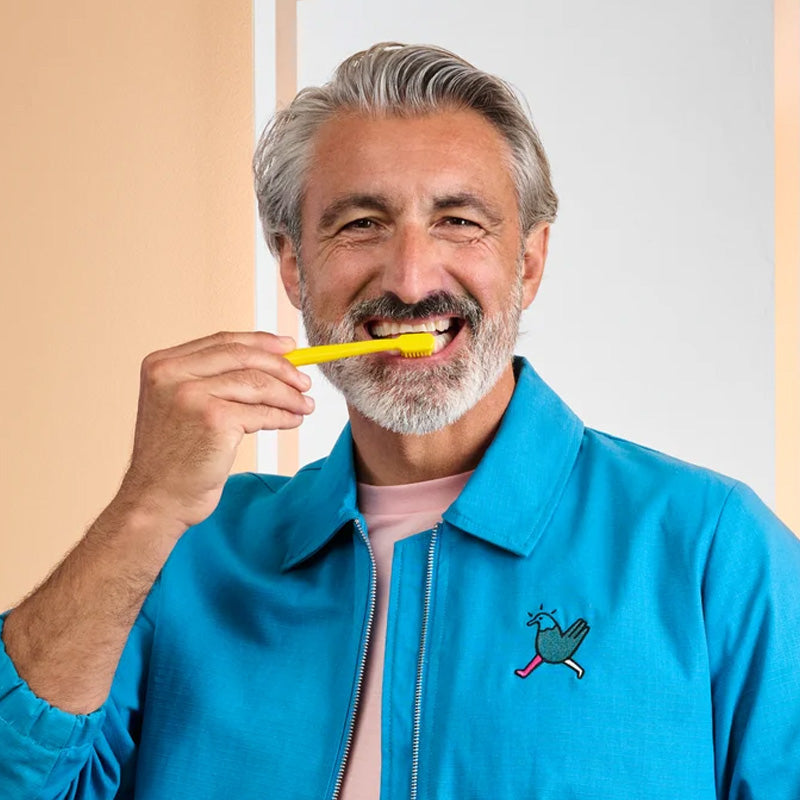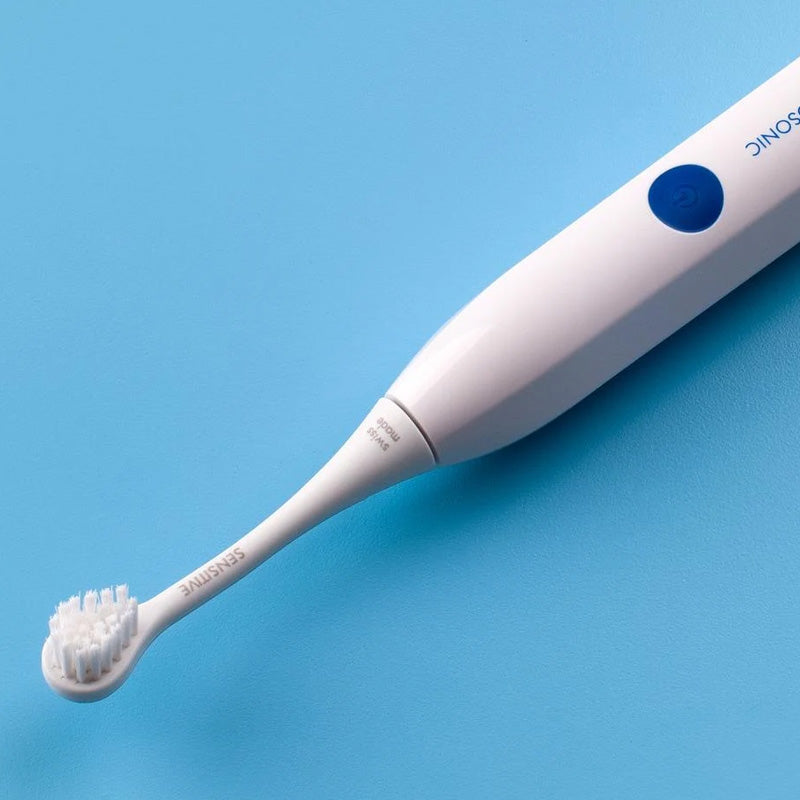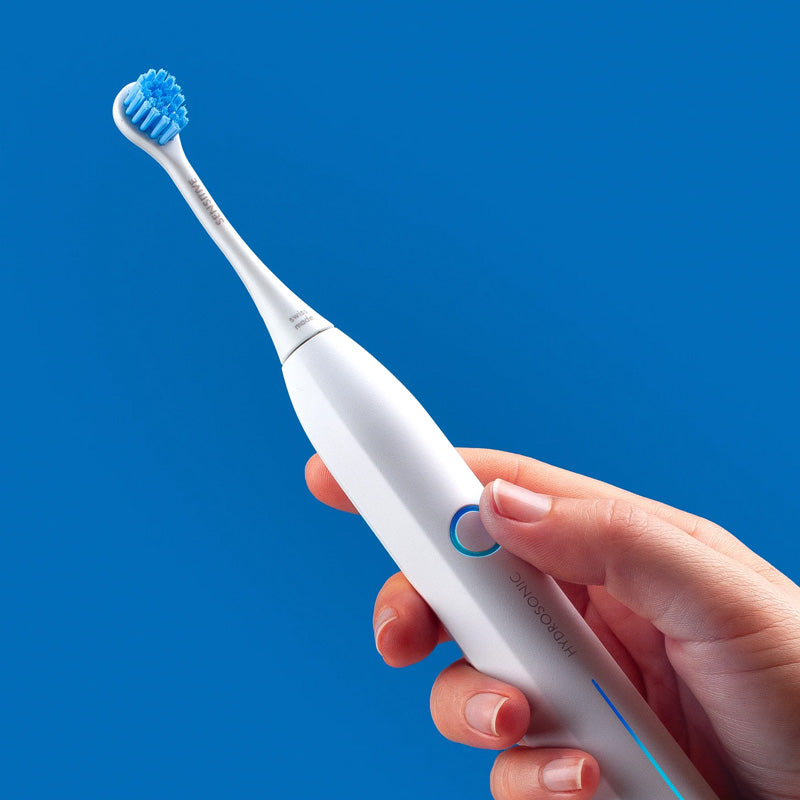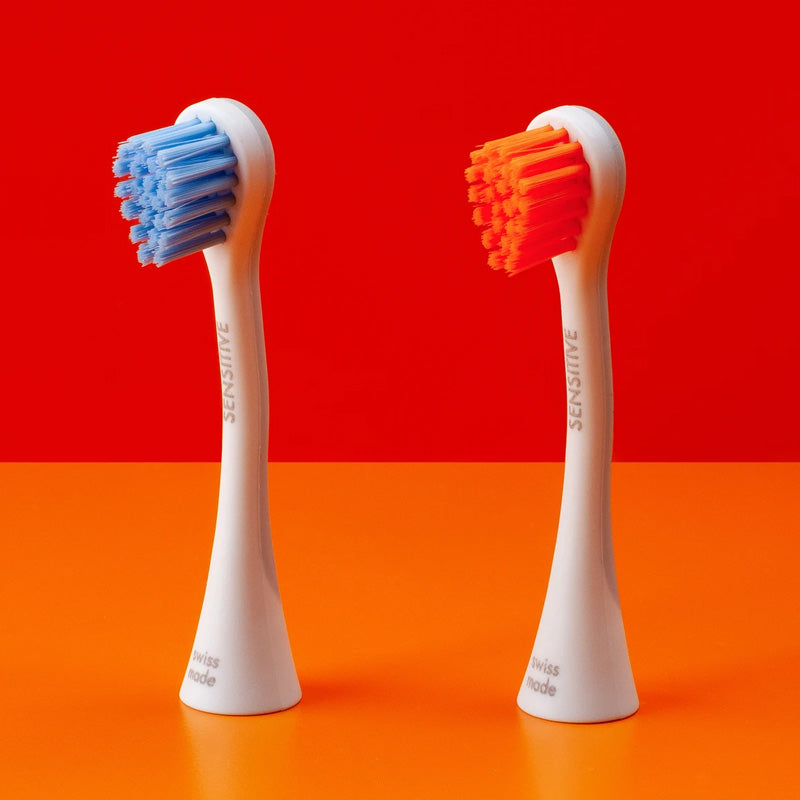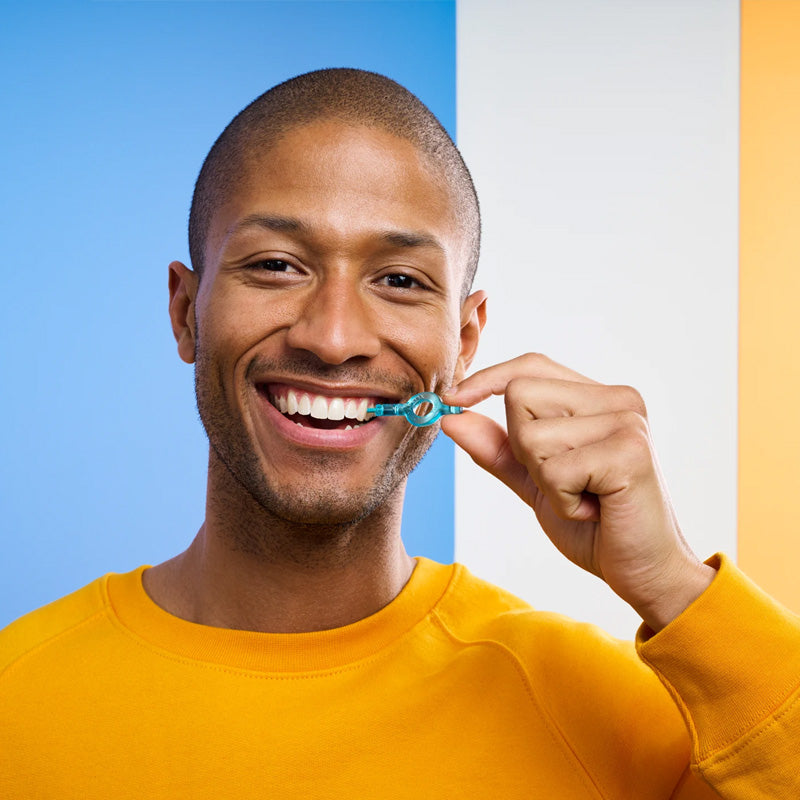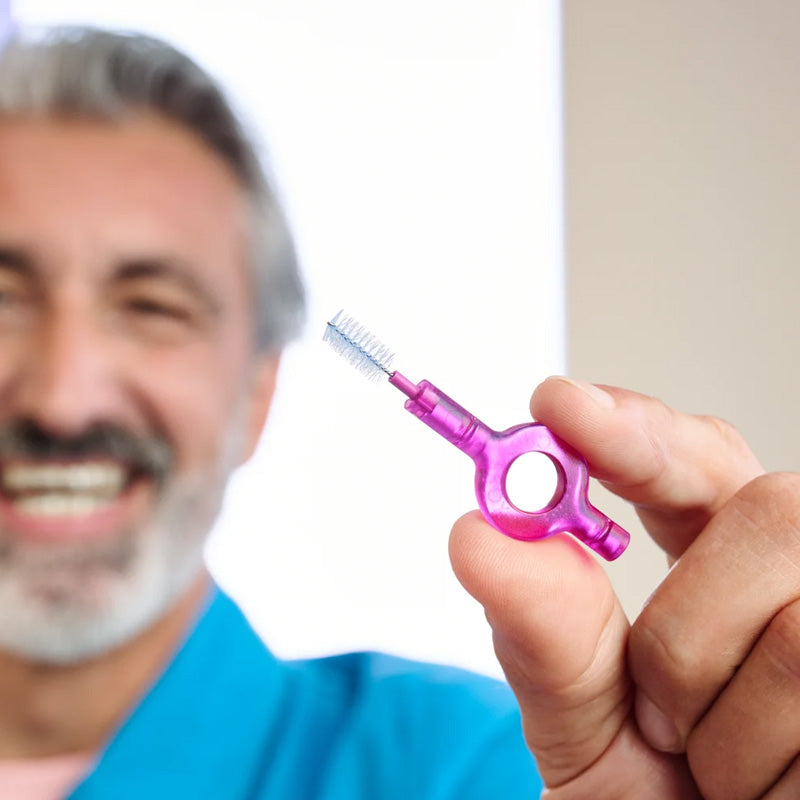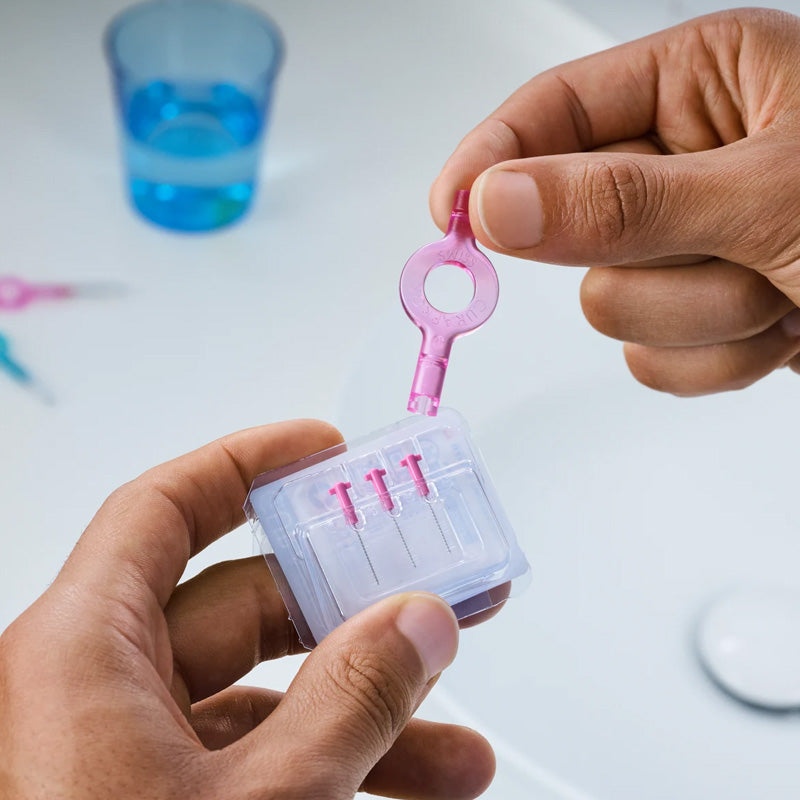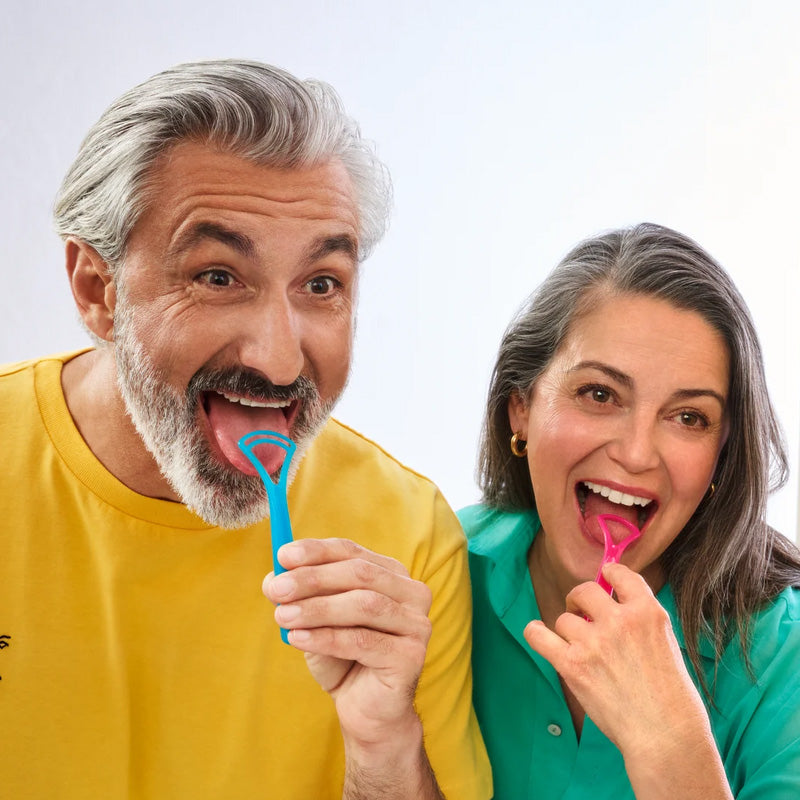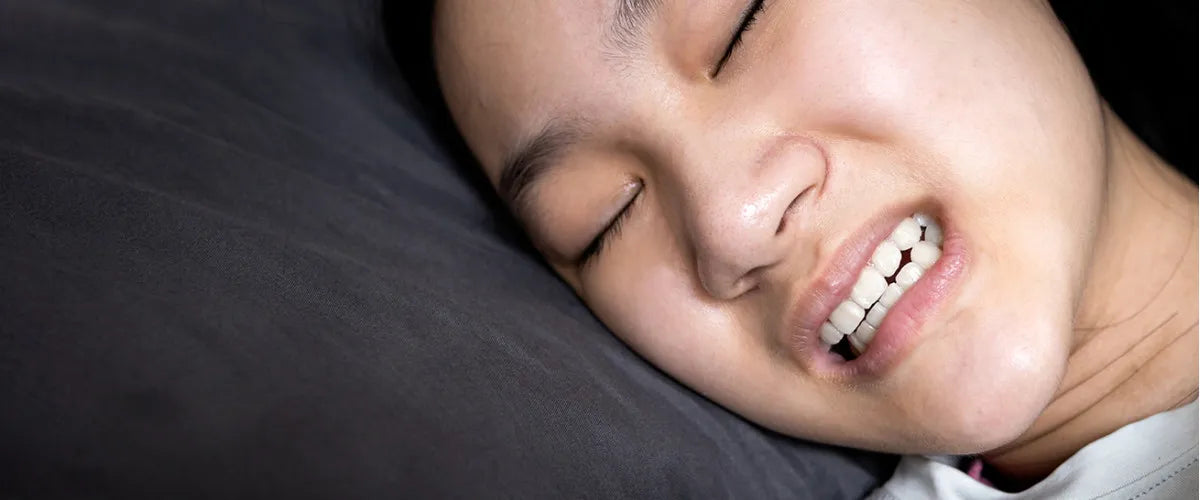One in two people experiences teeth grinding at least temporarily in the course of their lives - especially when life is currently full of stress and challenges. It is not for nothing that the German language knows phrases like "gritting one's teeth" or "accepting something with gritted teeth".
However, stress is often not the only trigger. In this article you will find an overview of all the important information: What exactly is teeth grinding? Where does it come from? And what can I do about teeth grinding?
Definition: What is teeth grinding?
The Latin technical term for teeth grinding is bruxism. In the ICD-10 classification, the phenomenon falls under "Other somatoform disorders" (F45.8) and "Other sleep disorders" (G47.8). But what exactly is teeth grinding?
When people grind their teeth, they unconsciously press their teeth together and rub them against each other. In doing so, they exert ten times as much pressure as when they chew - up to 480 kilograms per square centimetre and for up to 45 minutes a day! In the long run, the pressure wears away the enamel and causes severe dental problems. Experts call this a parafunction, because the activity of the jaw does not fulfil any actual purpose - such as chewing.
Teeth grinding during sleep and during the day
Teeth grinding usually happens at night when you are asleep. This is called sleep bruxism or nocturnal bruxism. Usually, people who grind their teeth do not notice their jaw activity at night, but the person next to them in bed does.
Teeth grinding can also occur during the day - especially when you are under a lot of stress. This is called waking bruxism or diurnal bruxism. Those affected then subconsciously clench their teeth hard.
Centric and eccentric bruxism
Experts also distinguish between centric and eccentric bruxism. In centric bruxism, sufferers clench their teeth with enormous force - but without friction. The typical grinding noise only occurs in eccentric bruxism when sufferers rub their teeth together.
Teeth grinding in children and babies
Teeth grinding at night is not a cause for concern in babies and toddlers. In fact, it is part of natural development and has the purpose of shaping the dentition. Teeth grinding during sleep in children helps the milk teeth find their place in the mouth and grinds down the chewing surfaces. It starts in 50 percent of babies as early as the tenth month of life. As long as your child has baby teeth, it is safe to grind your teeth at night. Dentists also call this process "teeth grinding".
However, the situation is different for school children. As soon as the permanent teeth have erupted, the teeth grinding should stop. However, if your child continues to grind his or her teeth, this is a sign of stress and psychological strain - just like with adults.
Symptoms: How do I recognise teeth grinding?
As teeth grinding is completely unconscious, those affected often do not know that they are affected at all. The first clue often comes from your partner, who is woken up in the night by the grinding noises. However, there are also some signs that you can use to recognise that you grind your teeth in your sleep.
How do you notice teeth grinding?
- You wake up with a toothache or pain in your chewing muscles and a tense jaw joint.
- You wake up with headaches and neck pain.
- Even though you have slept long enough, you feel like you are exhausted.
- You have small grinding marks and cracks on the enamel.
- Your chewing surfaces are polished smooth.
- Your teeth are particularly sensitive to pain.
Craniomandibular dysfunction (CMD)
In 20 to 30 percent of sleep bruxism patients, teeth grinding occurs together with pain in the mouth and face. This is called craniomandibular dysfunction (CMD). This is a collective term for various malfunctions of the jaw, which on the one hand lead to teeth grinding, and on the other hand can radiate to the back and cause pain there as well. CMD can even cause tinnitus, so that you constantly hear a noise.
The jaw is considered the strongest joint in the human body and is connected to the back, neck and ears via muscles and nerves. So if you suffer from other pains at the same time as grinding your teeth, it may well disappear automatically as soon as your jaw is in order again.
Possible side effects of teeth grinding with CMD
- Back pain
- Migraine
- Sore throat
- Headache
- Neck pain
- Tensions
- Earache and ear pressure
- Ringing in the ears (tinnitus)
- Swelling of the lymph nodes in the neck
Excursus: Where can toothache radiate to?
CMD is not always the cause of pain in the jaw and facial area. A tooth affected with caries or an inflamed tooth can also cause great pain that can radiate into the upper and lower jaw and even to the temple.
Consequences: What happens if I do not treat teeth grinding?
Untreated teeth grinding not only causes very unpleasant tension in the entire head, neck and back area, but can really damage your teeth. The friction with great pressure grinds away more and more tooth enamel. This leads to chipping and, in the long run, you also damage the dentin. In the process, you attack crowns and veneers just like your natural teeth. In the worst case, teeth can break completely. So if you grind your teeth for a long time and don't do anything about it, you can lose whole teeth.
Teeth grinding also has serious consequences for the gums: gum recession and gingivitis are common. Your teeth are also much more susceptible to decay, as the small cracks in the enamel are the ideal breeding ground for bacteria. That's why good dental care is especially important.
Good to know: The from Curaprox removes plaque even in hard-to-reach places because it has ten times as many bristles as a conventional toothbrush. It's also gentle on your gums.
Causes: Why does teeth grinding occur?
As with many diseases, there is not just one cause for teeth grinding, but many different possible reasons. So what does teeth grinding during sleep mean and where does it come from?
Stress and psyche
The expressions "gritting one's teeth" and "gritting one's teeth" do not come about by chance. There is a direct connection between stress or psychological strain and teeth grinding. Scientists have found that our brain reduces stress when we grind our teeth. Conversely, teeth grinding usually stops once the stressful situation is resolved and you are back to a relaxed normal state. If stress is the only cause of your teeth grinding and it is not a side effect of an illness or medication, it is called primary bruxism.
Good to know: One in two people grind their teeth at least temporarily when their professional or private lives cause stress. However, teeth grinding only becomes a chronic problem in 20 per cent of those affected.
Clenched bite
Misaligned teeth, ill-fitting or too large implants, fillings or crowns as well as teeth that grow out at an angle can lead to disturbances in the bite between the upper and lower jaws. Teeth grinding can then be an automatic reaction of the body to compensate for this misalignment or to remove the foreign body. The human dentition can already perceive a thin hair between the teeth and then automatically reacts with teeth grinding.
Tension of the masticatory muscles
Although we use the muscles in the jaw area every day - for eating and speaking, for example - they are often not properly utilised. We rarely open our mouths very wide and rarely chew really hard food. Most of our food consists of softly cooked food in bite-sized pieces. So if the chewing muscles have to make only small movements all the time, the muscles shorten and tension develops. Stress aggravates the tension and can trigger teeth grinding.
Unfavourable posture
Just as a malfunction of the jaw is a possible reason for back pain, poor posture can also affect the jaw. After all, the spine is connected to the jaw by nerves and muscles. So if you sit at a desk for many hours a day and don't keep a straight posture, a crooked back can be the reason why you grind your teeth.
Luxury food
Nicotine, caffeine and alcohol could also cause teeth grinding. So if your jaw becomes particularly active at night if you've been drinking the night before or you had to keep yourself awake with several cups of coffee the day before, you could do a little test. Does the teeth grinding stop when you stop consuming these stimulants? If so, you have found the cause.
Digression: Why do teeth grind after cola?
You may have noticed that after drinking cola, your teeth feel rough and strange and "grind". This is because the phosphoric acid extracts calcium and phosphate from your tooth enamel. The saliva simply washes away these minerals, which are particularly important for stability and hardness. The surface of the tooth is therefore initially rougher and softer than usual - until your saliva has supplied the enamel with calcium and phosphate again.
After drinking cola, you should therefore wait 30 minutes before brushing your teeth, so that you don't scrub off more enamel by brushing.
Magnesium deficiency
Sometimes teeth grinding simply means you have a magnesium deficiency. When we don't have enough magnesium in our blood, our muscles are generally more tense and we tend to have cramps. This is also true for the jaw muscles. In addition to teeth grinding, magnesium deficiency often leads to headaches, migraines and increased blood pressure.
Medicines
Teeth grinding can also be a side effect of certain medications. These include:
- Antidepressants
- Medicines for attention deficit hyperactivity disorder (ADHD)
Diseases
When teeth grinding occurs as a concomitant of other diseases, it is called secondary bruxism. Teeth grinding is particularly common together with sleep disorders such as snoring.
These diseases often go hand in hand with teeth grinding:
- Sleep apnoea: Nocturnal breathing pauses with heavy snoring
- Restless legs syndrome: Neurological disorder with a strong urge to move the legs.
- Ischaemia: Absence or reduction of blood flow to tissue.
- Nocturnal epilepsy: Epileptic seizure during sleep
- Parkinson's syndrome: disease of the nervous system with restricted movement and tremors
- Huntington's disease: movement disorder in the hereditary functional disorder of the brain
- Brain haemorrhages
Diagnosis: Which doctor helps with teeth grinding?
If you find yourself absent-mindedly clenching your teeth during the day, your partner informs you of teeth grinding at night or you wake up with jaw pain, your first port of call is your dentist. During a dental examination, he or she will determine how much damage the teeth grinding has already caused and whether you should wear a bite splint to protect your teeth.
An orthodontist can also advise you on a dental splint. If the reason for your teeth grinding is a misaligned tooth or an unsuitable or too large crown, your dentist can grind it down. A misalignment of the jaw can be treated with loose or fixed braces.
If your teeth grinding has another cause - for example, an underlying disease - your GP will prescribe treatment or refer you to a specialist.
Good to know: If you go for a check-up every six months, your dentist will be able to detect any damage to your teeth caused by teeth grinding. Even if you already wear a splint at night, you should still go for your six-monthly check-up.
Treatment: What can I do about teeth grinding?
If you recognise early that you grind your teeth, you don't have to worry too much about subsequent damage. You can usually protect your teeth from further damage. Here you can find out what you can do about grinding your teeth at night or during the day and what really helps.
Splint against teeth grinding
When asked "What to do when you grind your teeth?" your dentist will probably answer: "Wear a splint!" This is the standard method for teeth grinding. To protect your teeth from the abrasion caused by the pressure of grinding, you can wear a plastic splint at night. Your dentist or orthodontist will fit the splint to your teeth. When you wear it at night, your teeth cannot rub directly against each other. This protects the enamel and hard tissue of your teeth.
It is important to know here that the splint primarily serves to protect the teeth. It does not - or only temporarily - stop the teeth grinding itself. It is therefore a matter of treating a symptom and not the cause. It is even common for people to grind their teeth despite the splint.
If you wear fixed braces and still grind your teeth at night, it is best to contact your orthodontist directly to find out whether or not you should also use a splint.
Exercises against teeth grinding
If you really want to stop teeth grinding once and for all - with treatment without a splint - relaxation exercises are a possible home remedy. Since teeth grinding is caused, among other things, by tension in the chewing muscles, you can also try to get rid of it by relaxing accordingly.
If you search the internet for exercises against teeth grinding, you will find lots of videos on stretching and relaxing the chewing muscles that you can follow directly. Since the tension is often caused by a shortening of the muscles, it is important that you stretch the jaw muscles and perform movements that you do not tend to do in everyday life.
Here we would like to present a few helpful exercises against teeth grinding and pain in the jaw that are recommended by Bayerischer Rundfunk.
Exercise 1: Stretching the chewing muscles
- Sit upright on a chair, relax your shoulders and place one hand on your forehead.
- Open your mouth as wide as you can.
- Spread the thumb of the other hand so that it is approximately at right angles to the rest of the fingers.
- Place the area between your thumb and index finger against your chin and pull the lower jaw down a little further.
- Stay in this position for one to two minutes and continue breathing normally.
Exercise 2: Stretching the jaw muscles
- Sit upright on a chair and relax the shoulders.
- Put your left hand to your left temple.
- Place your right hand on the right side of your lower jaw.
- Open the mouth slightly and push the lower jaw diagonally down to the left.
- Stay in this position for one to two minutes and repeat the exercise on the other side of the lower jaw.
Exercise 3: Relaxing the jaw muscles
- Sit upright on a chair and relax the shoulders.
- Place your middle fingers on the small indentation next to the ear where you can clearly feel the opening and closing of the temporomandibular joint.
- Open and close the mouth several times (for 20 seconds), massaging the described area gently without pressing too hard.
Exercise 4: Relaxing the jaw muscles with fascia ball
- Sit upright on a chair and relax the shoulders.
- Take a fascia ball and massage the lower jaw in circular and spiral movements. If you don't have a fascia ball, you can also massage the lower jaw with your hand. Start at the beginning of the jawbone and work your way up to the chin.
- Apply light pressure and stay longer on painful areas.
- Change sides after one or two minutes.
Self-observation in waking bruxism
If you often clench your teeth unconsciously during the day, you can get rid of this annoying habit by observing yourself and consciously counteracting it. Remind yourself regularly to check if you are clenching your teeth. A reminder can be a colourful sticker on your mobile phone or laptop, a post-it on the wall or an automatic reminder in your mobile phone.
When you find yourself clenching your teeth again, consciously loosen your jaw and stretch your jaw muscles as described in the exercises above. If the situation does not allow it, you can briefly open and close your jaw with your mouth closed - preferably several times.
Physiotherapy
If you don't want to do the relaxation exercises for your jaw muscles on your own at home, but would rather have the support of a professional, it is advisable to go to a physiotherapist. Your physiotherapist can also show you suitable exercises to do at home, taking into account other pains such as back pain and neck pain. In physiotherapy, you can also loosen up your muscles with massages and heat treatments.
Magnesium
Some dentists recommend taking magnesium for teeth grinding. When we have enough magnesium in our blood, our muscles are less tense and muscle cramps are less likely to occur. It is best to take magnesium in the evening. Teeth grinding is said to decrease significantly within three to four weeks of taking magnesium regularly. If you prefer to take magnesium in natural form, you should add peas, beans, nuts and wholemeal products to your diet as a home remedy.
Medicines
There is no specific medication for teeth grinding. However, one of the main causes of teeth grinding is tension in the chewing muscles. Since the clenching and grinding of the teeth can cause further tension and painful muscle nodules, pain-relieving medication or medication for muscle relaxation can help in the short term. However, using these medications only relieves the symptoms and does not address the underlying cause. It is best to ask your doctor if and which medication is suitable for you.
Botox against teeth grinding
The medical substance botulinum toxin, better known as Botox, relaxes muscles and is therefore often used for teeth grinding. An oral and maxillofacial surgeon injects the active substance directly into the jaw muscle with a syringe. By relaxing the chewing muscles, the nightly grinding and clenching of the teeth stops and the strongly grown jaw muscle recedes.
The effect starts a few days after the injection and usually lasts about six months. The cost of Botox treatment for teeth grinding is around 300 to 500 euros. Private health insurance companies often cover the costs. If you have statutory health insurance, you have to apply for the costs to be covered.
Stress management
If you want to know what you can do against teeth grinding without a splint, you should not only relax your chewing muscles, but also yourself. Since stress and psychological strain are one of the main causes, relaxation exercises and psychotherapy are considered effective measures against teeth grinding.
In addition to relaxation techniques such as autogenic training or progressive muscle relaxation according to Jakobsen, there are a number of habits that you can easily implement in everyday life without having to learn a special technique. In the meantime, health insurance companies also offer numerous further training opportunities on the topic of stress management, which are usually free of charge.
Relaxation exercises and mindfulness
If you want to stop grinding your teeth while you sleep, relaxation and mindfulness exercises can be a great help. Without pent-up tension, your jaw muscles don't have to relieve stress.
The following habits can help against teeth grinding during sleep:
- Journaling: Before going to bed, close with the events of the day by writing down what is bothering you.
- Keep a gratitude diary: Focus on positive things and write down what you are grateful for and what went well that day.
- Do a guided evening meditation to relax before going to bed. There are numerous videos on the internet for this. However, there are also meditation apps that are recognised by statutory and private health insurers.
- Listen to music that relaxes you before going to bed.
- Take an evening walk to clear your head.
Treat yourself to a relaxing bath (for example with lavender or other relaxing essential oils).
Biofeedback therapy
Biofeedback therapy is primarily about making unconscious bodily functions - in this case teeth grinding - conscious. In this form of therapy, patients wear a technical device on their cheek at night that vibrates or sends acoustic signals as soon as teeth grinding begins. This enables the patient to consciously stop. The aim is to train the body to stop grinding and clenching the teeth.
While there are reports of successful applications where teeth grinding has been stopped, the constant interruption of sleep can also lead to even more stress. Furthermore, teeth grinding may return when the device is no longer in use.
Alternative methods
There are also treatment methods outside of orthodox medicine to prevent teeth grinding without a splint.
Osteopathy
Many people also try osteopathy for teeth grinding - especially when it occurs together with back pain, sore throat, earache or migraine. Similar to physiotherapy, osteopathy also examines connections between the jaw and other parts of the body. The difference is that physiotherapy alleviates acute symptoms, whereas osteopathy is an alternative, holistic method of treatment. The osteopath diagnoses the cause of the teeth grinding or the accompanying pain by palpation and then suggests an appropriate therapy.
Homeopathy
Do you want to beat teeth grinding with homeopathic remedies? Then it is best to consult an alternative practitioner to find the right globules with the right dosage. It is important to know, however, that there are no scientifically proven effects of homeopathic healing methods. According to the current state of research, the so-called "placebo effect" is responsible for improvements - the Helmholtz Association of German Research Centres, among others, came to this conclusion, citing two meta-studies published in the specialist journals "The Lancet" (1997) and "Sytematic Reviews" (2017).
Traditional Chinese Medicine (TCM)
In traditional Chinese medicine, teeth grinding is a sign of internal tension and can indicate a disturbance in liver function that is harmful to the teeth. The preferred form of therapy is acupuncture.
Hypnosis
Hypnosis is a form of treatment designed to address the real causes of teeth grinding. When the patient is in a deeply relaxed trance state, the hypnotherapist can search for the underlying problem in the subconscious and dissolve blockages. This is to replace negative feelings and thought patterns with positive ones. You can also use hypnosis in the form of self-hypnosis for muscle relaxation. There are already some scientific studies on the effectiveness of hypnosis for CMD, which are summarised in the Swiss Journal of Holistic Medicine.
Five tips to prevent teeth grinding
To prevent unpleasant rubbing and squeezing at night or during the day, we have collected some tips for you here.
This is how you can prevent teeth grinding:
1. Integrate stress management into your everyday life
Since teeth grinding and stress are directly related, you should make sure that stress does not build up in the first place. Mindfulness and relaxation exercises before bedtime are good ways to actively reduce stress. But activities that release happiness hormones are also ideal. These include exercise - especially outdoors - but also physical contact with people we love and laughter.

2. Give your chewing muscles variety
To avoid a shortening of the chewing muscles, which can ultimately lead to teeth grinding, you should open your mouth really wide from time to time and also chew hard foods. Treat yourself more often to a crunchy apple or nuts that need to be ground up by your jaw. Open your mouth as wide as you can when yawning.
3. Observe yourself
Are you sometimes surprised to find that you clench your teeth when you are highly concentrated or tense? Then consciously loosen your jaw to get out of this literally dogged posture and stretch the jaw muscles in all directions.
4. Eat foods containing magnesium
According to the German Consumer Advice Centre, two servings of fruit, three servings of vegetables and wholemeal products are sufficient to ensure magnesium intake. A handful of sunflower seeds or nuts are also ideal for topping up the magnesium supply. Since magnesium deficiency is a possible cause of teeth grinding, you can prevent it by including magnesium-rich foods such as peas, beans, nuts and whole grains in your diet.
5. Take good care of your teeth
If you take great care of your teeth, you will quickly notice if something is wrong and the chewing surfaces feel abraded, for example, or you feel rough spots due to chipping in the enamel. It's also important to have a check-up with your dentist every six months. This way, your dentist can detect signs of teeth grinding immediately and prevent serious damage to the enamel and gums.
Good to know: Did you know that the wrong toothbrush and brushing technique can damage your gums? Heavy scrubbing and hard toothbrushes push the gums away and expose the necks of the teeth. Once the necks of the teeth are exposed, the gums will not grow back. It's better to clean really thoroughly with a soft toothbrush and gentle technique. You can find out how to do this here:
Brushing your teeth properly - instructions for the best technique
Sources
- Bayerischer Rundfunk: Exercises against pain in the jaw.
- Besimo, Christian E.: Hypnose als Teil der integrativen Diagnostik und Therapie kraniomandibulärer Dysfunktionen, in Schweizerische Zeitschrift für Ganzheitsmedizin, 2012.
- Bujard, Martina: Zähneknirschen (Bruxismus), on: deximed.de.
- Egli Dentistry: Bruxism: What helps against teeth grinding, Egli Dentistry clarifies.
- Feichter, Martina: Teeth grinding (bruxism), on: netdoktor.de.
- Fiebig, Ludwig: Traditionelle Chinesische Medizin in der Zahnheilkunde, in: Mensch und Mund, 4/2015.
- Focus online: Sleep apnoea: Snorers are often teeth-grinders.
- Frank Dentists: Teeth grinding and magnesium deficiency.
- informedhealthonline.org: Ischaemia.
- Heinrich, Christian: Alternative Medicine. Does homeopathy really work?, on: helmholtz.de.
- Liebscher-Bracht, Roland: Bruxismus (Teeth grinding) - Symptoms, causes and exercises, at: liebscher-bracht.com
- Linde, Klaus et al: Are the clinical effects of homoeopathy placebo effects? A meta-analysis of placebo-controlled trials, in: The Lancet, 1997.
- Mathie, Robert T. et al: Randomised, double-blind, placebo-controlled trials of non-individualised homeopathic treatment: systematic review and meta-analysis, in: Systematic Reviews, 2017.
- MedSpecialists: Botox for bruxism (teeth grinding).
- Oral and Maxillofacial Surgery Iserlohn: Stress-related teeth grinding: Botox® administration relaxes masticatory muscles.
- Neurologists and psychiatrists on the net: What is Parkinson's syndrome?.
- Novacura: An easy way to stop teeth grinding.
- Physio am Ring: Back pain due to jaw and tooth problems.
- Priehler, Karin: Teeth grinding: Taking the pressure off, on: apotheken-umschau.de.
- Private practice for ENT Chemnitz: Botox therapy helps against nocturnal teeth grinding.
- Schmidt, Marion: Vorsicht Schmelzfresser!, on: stern.de.
- University Hospital Freiburg: The movement disorder Huntington's disease.
- University Hospital Zurich: Restless Legs Syndrome.
- Klartext Nahrungsergänzung (An offer from the consumer advice centre): Magnesium - what to look out for?
- Wille, Ricarda: Toothache, on prodente.de.
- Hamburg Dental Association: Treat teeth grinding/bruxism in good time.
- Dental practice Dr. Elena Heinemann: Coca Cola - harmful for the teeth?...
Read more
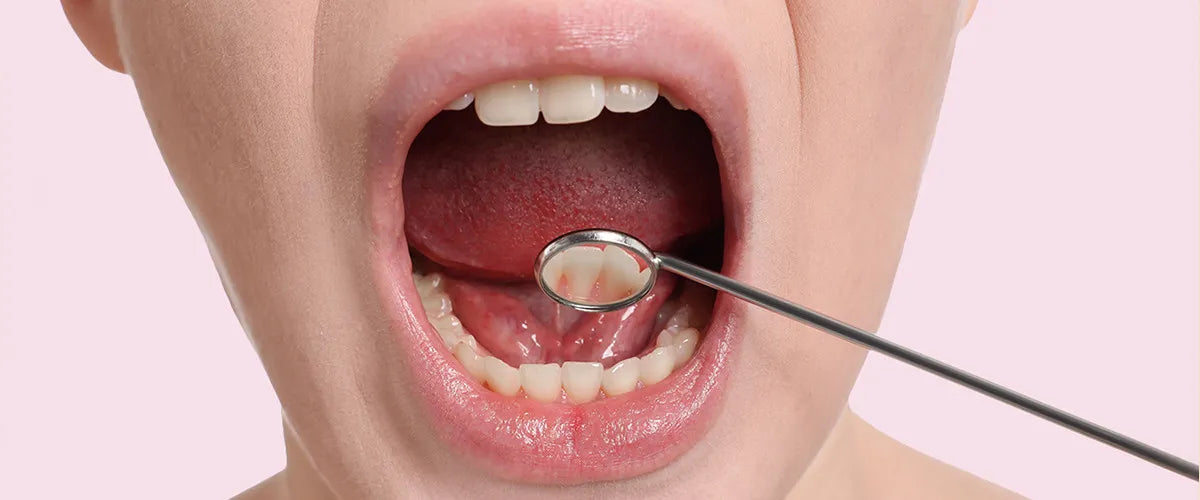
Roughly one tenth of all malignant tumours in German oral cavity cancer patients are located in the floor of the mouth. There is a good chance of the cancer being cured if it is detected early enou...
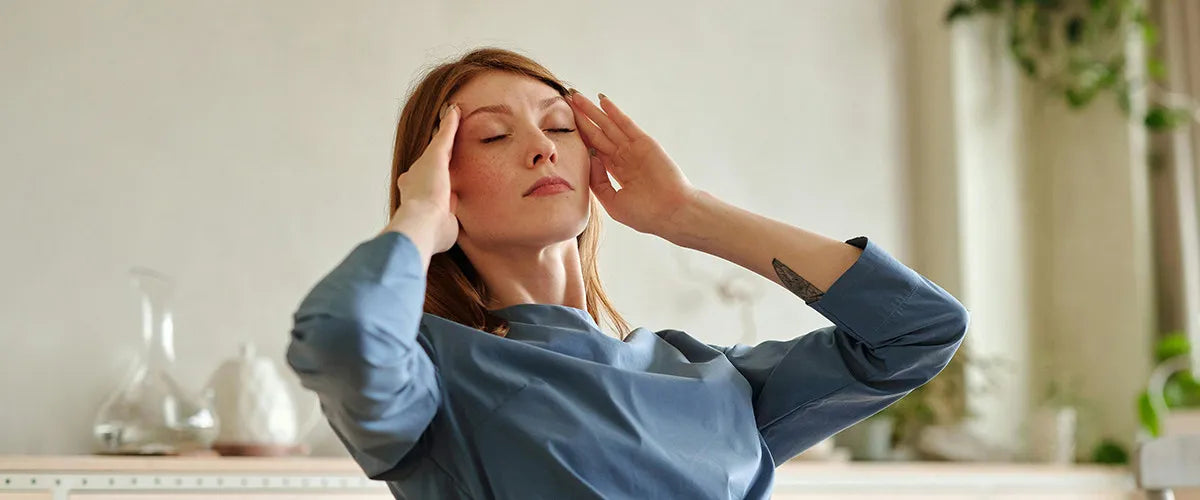
Everyone knows them: headaches occur from time to time - sometimes they creep up slowly, sometimes they come on suddenly. As a rule, they can be easily managed with home remedies or painkillers. Ho...
